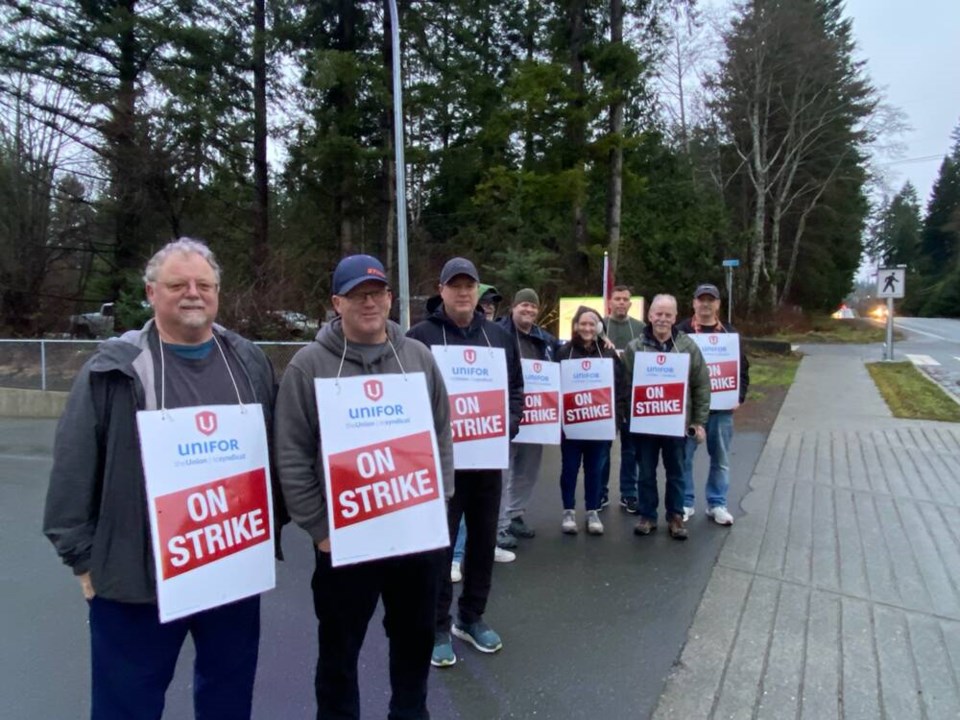Transit service in Campbell River and the Comox Valley was suspended Friday when bus drivers walked off the job after contract talks broke down.
About 40 members of Unifor Local 114, which represents bus drivers and others working for the two transit systems, set up picket lines at bus depots in Campbell River and the Comox Valley early Friday.
HandyDART services for medical and other critical appointments will continue on weekdays throughout the strike under essential-service agreements.
The union argues that low pay is causing recruitment and retention problems, leading to a systemic reliance on overtime.
A casual transit-driver position with Pacific Western Transportation, which is contracted by B.C. Transit to deliver transit service in Campbell River and the Comox Valley, pays $21.18 to $28.48 an hour.
“Out of the five new hires in the last month or so, three of them resigned before they even finished training,” said Gavin Davies, national representative for Unifor. “They just found a job that pays more.”
Davies called on B.C. Transit to “properly fund these private companies that are running public transit in B.C.”
Local 114 president Gord McGrath said in a statement that exhausted drivers are a road-safety issue. “We want to see additional staffing and an increase in transit service — two things that would greatly benefit these communities.”
About 75 Local 114 members who work as bus drivers, HandyDART drivers, mechanics, and cleaners are participating in the strike, said Davies, adding picket lines will stay up seven days a week and members are prepared to maintain the strike for as long as it takes to improve public transit in the region.
Unifor said it wants B.C. Transit at the bargaining table along with Pacific Western Transportation.
But so far, B.C. Transit has not waded into the labour disputes between its contracted private transit operators and unionized workers that have been occurring across the province, including a months-long strike that saw residents of the Fraser Valley go without bus service for most of this summer.
A B.C. Transit spokesperson told the Times Colonist that B.C. Transit is “not at liberty to discuss the issue” as it is a labour dispute between PWTransit Canada, a contractor, and its unionized employees.
On Wednesday, PWTransit said in a statement it is disappointed that the union has rejected two contract proposals in the past four weeks. “The company believes we have taken every measure to come to an agreement at the bargaining table and avoid a strike situation.”
In November, union members voted down a tentative agreement that included a four per cent wage increase each year for the next three years, plus a three per cent increase as of the date of ratification.
Union members rejected another tentative agreement this month that would have offered a “smaller increase in compensation over and above” the first tentative agreement, the company said.
Unifor said Friday that the latest offer from the employer was adding “insult to injury.”
Campbell River Mayor Kermit Dahl said the city is monitoring the situation closely and is hopeful that the parties will find a swift resolution.
“Transit disruptions affect many Campbell River residents and I, on behalf of council, want you to know that we hear you and understand that job action is difficult for everyone involved,” Dahl said in a statement.
Dahl urged residents to share their concerns and feedback with B.C. Transit.
The North Island College student union said it stands in solidarity with the striking workers, even though the labour disruption is occurring during exam season.
“We understand that many of our members rely on transit to get to campus, and the disruption of bus services can be especially stressful during the exam period we are currently in,” the student union said in a statement. “Many of our members are also workers, relying on transit to get to their own opportunities for earnings.”
Carissa Wilson, the student union’s executive director, said the strike will affect international students the most, as most don’t own cars. “There’s definitely some ride-sharing and people walking,” she said.
“But we are definitely in favour and in solidarity with the members of Unifor 114. The drivers in this community are paid less than drivers in the nearby communities, and that’s just not right.”
The company said it does not know when it can return to regular bus service and declined to further comment on labour negotiations.
The union has been in a strike position since Nov. 19. The contract between the union and company expired on March 31.




